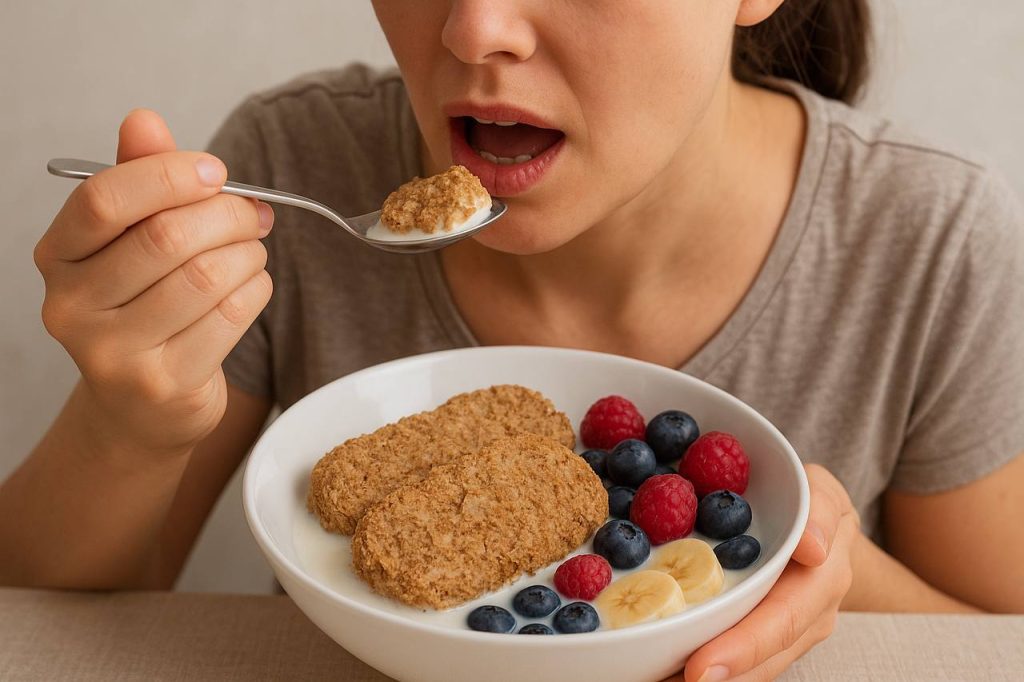Is Weetabix Good for Weight Loss? Brief Look
What Weetabix Brings to the Table
When the morning alarm goes off and you reach for breakfast, what you choose can set the tone for your whole day. Weetabix is often pitched as a solid start – two biscuits deliver around 136 kcal, about 3.8 g fibre, 1.6–1.7 g sugars and low fat. It has wholegrain wheat, iron, B-vitamins and a “green traffic light” label for fat, sugar and salt. Fine so far.
So: does that make it an effective weight-loss breakfast? Possibly – but only if you play the rest of your day well.
Why It Could Help with Losing Weight
There are a few reasons one might pick Weetabix as part of a weight-loss plan:
| Fibre content | At 3.8 g fibre per serving it helps slow digestion and may support fuller feelings after breakfast. |
| Low sugar and low fat (for a cereal) | Many breakfast options are stacked with sugar or hidden fat. Here the numbers are modest. |
| Simple portion size and clarity | Two biscuits is easy. 136 kcal gives you a baseline. In short, it can anchor your breakfast in a lower-calorie, higher-fibre zone. For people chasing a calorie-deficit, that is useful. |
Why It Isn’t a Magic
Let’s get honest, this isn’t a “lose 10 kg in two weeks” solution. There are caveats. 136 kcal is fine – but if you add full-fat milk, honey, syrup, lots of fruit and nuts, your breakfast may end up 250-300 kcal or more. The cut advantage fades. The fibre is okay – but 3.8 g is not huge. For weight-loss you benefit from higher fibre and also moderate-to-higher protein. Weetabix is modest on protein. Breakfast is one meal. If lunch, snacks and dinner are heavy you’ll undo the head start. Managing weight requires more than one good meal. Buyers point out that the carbohydrate load (26 g carbs per serving) still raises blood sugar and may leave you somewhat hungry later.
So yes: Weetabix can help – but only as part of a broader plan.
How to Use It Smartly for Weight Loss
Here are some practical tweaks to make this cereal work better:
Smart Practices
- Stick to two biscuits + semi-skimmed or skimmed milk (or alternative); aim for < 200 kcal for breakfast.
- Add fresh fruit (berries, banana) for fibre and nutrients.
- Avoid adding lots of syrup, sugar or heavy toppings. That erases benefits.
Things to Watch
- If you’re active and need more calories, adjust – maybe add yoghurt or seeds, but still mind total intake.
- Monitor afternoon hunger – if you’re starving by 11.30, the breakfast might not be enough for you.
- Remember that owning a breakfast cereal doesn’t give licence for overeating later.

What the Research and Experts Say
According to Diabetes UK, Weetabix scores well – two biscuits provide 136 kcal, 26 g carbs and just 1.7 g sugar. The cereal also appears in journalist listings of “better breakfast cereals” based on fibre, sugar and processing.
However, no large long-term weight-loss trial uses Weetabix as the intervention. It’s a good food, not a weight-loss therapy. The weight-loss effect depends on what you do around it: total calories, movement, sleep, stress.
Straight Talk
Let’s keep it blunt. If you swap a high-sugar, high-fat breakfast for two biscuits of Weetabix + milk + berries, you are likely to eat fewer calories and get more fibre. That shift alone can help you lose weight. But if you think “I’ll eat Weetabix and relax the rest of my diet” – you’ll be disappointed.
Weight loss is like painting a room: you need the primer, the colour, the finishing touches. Weetabix can be the primer – but you still need the other coats. Use it wisely.
Who It Works Well for – and Who May Need More
Good fit:
- Someone who eats big breakfasts, wants to cut calories without feeling deprived.
- Someone who needs a convenient, consistent breakfast they can build on.
Might not be enough on its own: - If your lunch and dinner are uncontrolled, breakfast won’t counterbalance it.
- If you need higher protein in the morning (e.g., you train heavily, build muscle), you might prefer a higher-protein breakfast.
- If you snack frequently mid-morning due to unstable blood sugar, you may need a breakfast with more sustaining elements than cereals alone.
Final Thoughts
Yes – Weetabix can be a part of a weight-loss strategy. It hits many of the right notes: low sugar, wholegrain, simple portion. But no – it is not a standalone weight-loss solution. If you want sustainable results you must work the rest of the day too. Activity, good sleep, hydration, boundaries on snacks… these things still matter. Possibly you’ll lose more weight by focusing on your lunch and dinner than obsessing over cereal. Let’s keep it realistic. Breakfast cereals like Weetabix help – but they don’t replace the rest of the picture. As stated on its official website, “The key to a healthy diet is balance. No one food provides all the nutrients (food components) you need for health.”
